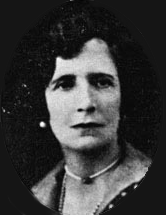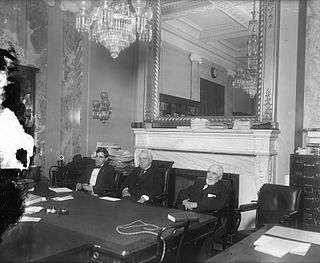Related Research Articles

The Bolsheviks, led by Vladimir Lenin, were a far-left faction of the Marxist Russian Social Democratic Labour Party (RSDLP) which split with the Mensheviks at the Second Party Congress in 1903. The Bolshevik party seized power in Russia in the October Revolution of 1917, and was later renamed the Communist Party of the Soviet Union. Their ideology and practices, based on Leninist and later Marxist–Leninist principles, are known as Bolshevism.
Bolshevism is a revolutionary socialist current of Soviet Leninist and later Marxist–Leninist political thought and political regime associated with the formation of a rigidly centralized, cohesive and disciplined party of social revolution, focused on overthrowing the existing capitalist state system, seizing power and establishing the "dictatorship of the proletariat".

Symon Vasylyovych Petliura was an Ukrainian politician and journalist. He was the Supreme Commander of the Ukrainian People's Army (UNA) and led the Ukrainian People's Republic during the Ukrainian War of Independence, a part of the wider Russian Civil War.
The American Jewish Committee (AJC) is a Jewish advocacy group established on November 11, 1906. It is one of the oldest Jewish advocacy organizations and, according to The New York Times, is "widely regarded as the dean of American Jewish organizations". As of 2009, AJC envisions itself as the "Global Center for Jewish and Israel Advocacy".

The first Red Scare was a period during the early 20th-century history of the United States marked by a widespread fear of far-left movements, including Bolshevism and anarchism, due to real and imagined events; real events included the Russian 1917 October Revolution and anarchist bombings in the U.S. At its height in 1919–1920, concerns over the effects of radical political agitation in American society and the alleged spread of socialism, communism, and anarchism in the American labor movement fueled a general sense of concern.

Nesta Helen Webster was an English author who revived conspiracy theories about the Illuminati. She claimed that the secret society's members were occultists, plotting communist world domination, through a Jewish cabal, the Masons and Jesuits. She blamed the group for events including the French Revolution, 1848 Revolution, the First World War, and the Bolshevik Revolution. Her writing influenced later conspiracy theories and ideologies, including American anti-communism and the militia movement.
Żydokomuna is an anti-communist and antisemitic canard, or a pejorative stereotype, suggesting that most Jews collaborated with the Soviet Union in importing communism into Poland, or that there was an exclusively Jewish conspiracy to do so. A Polish language term for "Jewish Bolshevism", or more literally "Jewish communism", Żydokomuna is related to the "Jewish world conspiracy" myth.

The history of the Jews in Ukraine dates back over a thousand years; Jewish communities have existed in the modern territory of Ukraine from the time of the Kievan Rus'. Important Jewish religious and cultural movements, from Hasidism to Zionism, arose there. According to the World Jewish Congress, the Jewish community in Ukraine constitutes Europe's third-largest and the world's fifth-largest.
Jewish Bolshevism, also Judeo–Bolshevism, is an antisemitic conspiracy theory that claims that the Russian Revolution of 1917 was a Jewish plot and that Jews controlled the Soviet Union and international communist movements, often in furtherance of a plan to destroy Western civilization. It was one of the main Nazi beliefs that served as an ideological justification for the German invasion of the Soviet Union and the Holocaust.
The League of East European States or Federation of East European States was a 1914 proposal by the German Committee for Freeing of Russian Jews for a German-dominated consociational buffer state to be established in the Russian Partition of the multi-ethnic territory of the former Polish–Lithuanian Commonwealth.

The Russian Soviet Government Bureau (1919-1921), sometimes known as the "Soviet Bureau," was an unofficial diplomatic organization established by the Russian Soviet Federative Socialist Republic in the United States during the Russian Civil War. The Soviet Bureau primarily functioned as a trade and information agency of the Soviet government. Suspected of engaging in political subversion, the Soviet Bureau was raided by law enforcement authorities at the behest of the Lusk Committee of the New York State legislature in 1919. The Bureau was terminated early in 1921.

The Overman Committee was a special subcommittee of the United States Senate Committee on the Judiciary chaired by North Carolina Democrat Lee Slater Overman. Between September 1918 and June 1919, it investigated German and Bolshevik elements in the United States. It was an early forerunner of the better known House Un-American Activities Committee, and represented the first congressional committee investigation of communism.

Yemelyan Mikhailovich Yaroslavsky was a Bolshevik revolutionary, Communist Party functionary, journalist and historian.

The Jewish Socialist Federation (JSF) was a secular Jewish Yiddish-oriented organization founded in 1912 which acted as a language federation in the Socialist Party of America (SPA). Many of the founding members of the JSF had previously been members of the Bund in Eastern Europe and sought to bring Bundist politics to the socialist movement in the USA.

The Union of Russian Workers in the United States and Canada, commonly known as the "Union of Russian Workers" was an anarcho-syndicalist union of Russian emigrants in the United States. The group was established shortly after the failure of the Russian Revolution of 1905 and was essentially annihilated in America by the 1919 Red Scare in which it was targeted by the Bureau of Investigation of the U.S. Department of Justice. Thousands of the group's adherents were arrested and hundreds deported in 1919 and 1920; still more voluntarily returned to Soviet Russia. During its brief existence the organization, which was only loosely affiliated with the Industrial Workers of the World, published numerous books and pamphlets in Russian by anarchist writers, operated reading rooms and conducted courses to teach newly arrived Russians English, and fulfilled a social function for emigrants half a world from home.
Zosa Szajkowski was an American historian born in Russian Partition of Poland, whose work is important in Jewish historiography.

Raphael Abramovitch Rein, best known as Raphael Abramovitch, was a Russian socialist, a member of the General Jewish Workers' Union in Lithuania, Poland and Russia (Bund), and a leader of the Menshevik wing of the Russian Social-Democratic Workers' Party (RSDRP).

The Russian Socialist Federation was a semi-autonomous American political organization which was part of the Socialist Party of America from 1915 until the split of the national organization into rival socialist and communist organizations in the summer of 1919. Elements of the Russian Socialist Federation became key components of both the Communist Party of America and the rival Communist Labor Party of America as "Russian Federations" within these organizations. Following the unification of these two groups in 1921, the resulting unified Russian Communist Federation gradually evolved into the so-called Russian Bureau of the Communist Party, USA.
Di Tsayt was a Yiddish language daily newspaper published in New York City, United States 1920-1922. Di Tsayt was a national organ of the Labor Zionist Poale Zion movement in the United States. It was published by the Poale Zion Publishing Association. The playwright David Pinski was the editor of Di Tsayt.

The 1st Congress of the RSDLP was held between 13 March – 15 March 1898 in Minsk, Russian Empire in secrecy. The venue was a house belonging to Rumyantsev, a railway worker on the outskirts of Minsk. The cover story was that they were celebrating the nameday of Rumyantsev's wife. A stove was kept burning in the next room in case secret papers had to be burnt.
References
- ↑ Szajkowski, Zosa. 1974. Jews, Wars, and Communism Volume 2. New York: Ktav Pub, pg. 193
- ↑ Goldberg, Israel. 1954. The Jews in America. New York: The World Publishing Company, pg. 241-2
- ↑ Powers, Richard Gid. 1995. Not Without Honor: The History of American Anticommunism. New York, New York: The Free Press, pg.8
- 1 2 Powers, Richard Gid. 1995. Not Without Honor: The History of American Anticommunism. New York, New York: The Free Press, pg.46-47
- ↑ Wes, Marinus A. 1990. Michael Rostovtzeff, Historian in Exile. Stuttgart: F. Steiner, pg. 50
- 1 2 3 Kennan, George F. 1958. Soviet-American Relations, 1917-1920 Volume 2: The Decision to Intervene. Princeton New Jersey: Princeton University Press, pg. 322-23
- ↑ Szajkowski, Zosa. 1974. Jews, Wars, and Communism Volume 2. New York: Ktav Pub, pg. 194
- ↑ Roberts, Priscilla. 1997. Jewish Bankers, Russia, and the Soviet Union, 1900-1940: The Case of Kuhn, Loeb and Company. American Jewish archives 49(1-2):9-37, pg. 34
- 1 2 Szajkowski, Zosa. 1974. Jews, Wars, and Communism Volume 2. New York: Ktav Pub, pg. 195
- ↑ Roberts, Priscilla. 1997. Jewish Bankers, Russia, and the Soviet Union, 1900-1940: The Case of Kuhn, Loeb and Company. American Jewish archives 49(1-2):9-37, pg.25
- ↑ Lederhendler, Eli. 2017. American Jewry: A New Story. Cambridge, UK: Cambridge University Press, pg.192
- ↑ Szajkowski, Zosa. 1974. Jews, Wars, and Communism Volume 2. New York: Ktav Pub, pg 196
- ↑ Szajkowski, Zosa. 1974. Jews, Wars, and Communism Volume 2. New York: Ktav Pub, pg 196-97
- 1 2 Szajkowski, Zosa. 1974. Jews, Wars, and Communism Volume 2. New York: Ktav Pub, pg. 197
- 1 2 3 Szajkowski, Zosa. 1974. Jews, Wars, and Communism Volume 2. New York: Ktav Pub, pg. 198
- 1 2 Szajkowski, Zosa. 1974. Jews, Wars, and Communism Volume 2. New York: Ktav Pub, pg. 199
- 1 2 American Jewish Committee, Adler files
- ↑ Gerrits, Andre. 2011. The myth of Jewish communism: a historical interpretation. New York: P.I.E. Peter Lang, pg. 96
- ↑ McFadden, David W. 1993. Alternative paths : Soviets and Americans, 1917-1920. New York: Oxford University Press, pg.296
- 1 2 Powers, Richard Gid. 1995. Not Without Honor: The History of American Anticommunism. New York, New York: The Free Press, pg.48
- ↑ Baldwin, Neil. 2001. Henry Ford and the Jews. New York: PublicAffairs, pg.136
- 1 2 Silver, M. M. 2013. Louis Marshall and the rise of Jewish ethnicity in America : a biography.Syracuse, New York : Syracuse University Press, pg. 334
- 1 2 Kotzin, Daniel P. 2010. Judah L. Magnes: An American Jewish Nonconformist. New York: Syracuse University Press, pg. 153-54
- ↑ Baldwin, Neil. 2001. Henry Ford and the Jews. New York: PublicAffairs, pg. 129
- ↑ Baldwin, Neil. 2001. Henry Ford and the Jews. New York: PublicAffairs, pg. 133
- ↑ Baldwin, Neil. 2001. Henry Ford and the Jews. New York: PublicAffairs, pg. 144-45
- ↑ Baldwin, Neil. 2001. Henry Ford and the Jews. New York: PublicAffairs, pg. 147-48